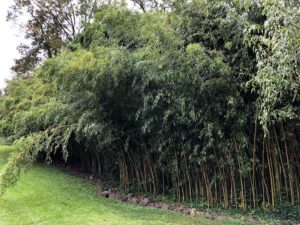
-Written by Liu Mochizuki proud employee of Professional Bamboo Landscapers LLC-
When I ask people what they know or think about bamboo, most of the
time there are two possible outcomes. Either they fear and loathe it because it’s
invading their backyard or love it because it looks pretty and gives off that
oriental zen vibe. Once in a while, someone might mention the fact that it’s 99%
of a panda’s diet. The fact of the matter is that most people don’t know much
about bamboo. But rest assured, I’m here to deliver the hard bamboo facts. Some
may be appealing, others not so much…
Bamboo is not a tree:
Bamboo is actually a tall grass. It grows thanks to a shallow root system just like
the grass in your lawn. The only difference: the roots (rhizomes) shoot up tall
canes that can go up to 40 feet.
Bamboo works harder than trees:
Bamboo absorbs carbon dioxide just like trees but releases 30% more fresh
oxygen into the atmosphere. We could all use a little bit of fresh air.
Bamboo grows FAST:
Certain species of bamboo can grow up to 1.5 inches per hour during peak
growth seasons. Bamboo reaches full maturity in 1 to 5 years as opposed to a
tree, which cam take 30 to 40 years.
Bamboo renews itself:
Even once harvested bamboo will keep growing from its remarkable rhizome
(root) system. No replanting, fertilizer or pesticides needed. Bamboo is a strong,
independent plant.
Bamboo comes in all sorts of colors:
You would think bamboo is always green but it can actually be brown, grey, blue,
red, orange, white, golden and even purple.
Bamboo is very durable:
Did you know that bamboo is tougher than steel? Bamboo’s chemical structure is
stronger than steel’s by quite a big margin. This makes bamboo a durable and
reliable building material. I would know, my Japanese ancestors have been
building houses out of bamboo for centuries!
Bamboo is bad for your yard but good for your immune system
Bamboo contains a bio agent that is naturally anti bacterial. It is known to reject
70% of the bacteria that try to grow on it.
Bamboo can be a healthy agent in your diet:
Bamboo shoots are a great source of fiber and potassium. They’ve played a
significant role in various Asian cultures as a valuable food source. One shoot can
give you 10% of the recommended daily intake of fiber and potassium.
Bamboo is a citizen of the world:
Bamboo grows all over the world in all types of climate. Each continent has its
native species, except for Europe and Antarctica. Non-native species still grow in
those continents.
Bamboo is very diverse:
There are 1500 different species of bamboo around the world. Three of them are
native to North America and are usually not the ones you see in your backyards
(in New Jersey).
Historical fact:
Early settlers came across massive groves of bamboo, which they called
canebrakes. These canebrakes were so dense and impenetrable that explorers
had to avoid them altogether. The largest canebrakes were found along the
Mississippi river.
